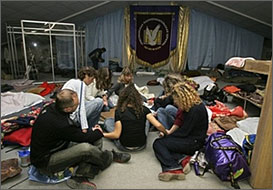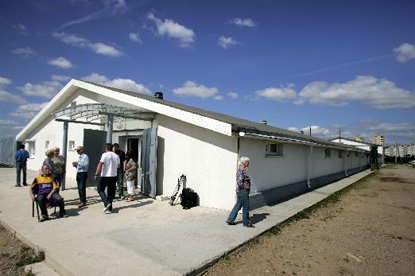First problems began in 2003 when a plot of land, which the New Life church occupied, was territorially reassigned to the city of Minsk; that automatically increased the cost of property. The authorities refused to give permissions to reconstruct the church building, which was refurbished from a collective farm cow shed.
In 2005 the Minsk municipality banned church services as in their opinion the building was not being used “as originally planned by its design and purposes.” This decision contradicted Article 25 of the Law on Freedom of Conscience in Religious Organisations of Belarus. It stipulates that religious services can be held on premises of the kind the New Life church owned. Nevertheless, church services were conducted illegally in spite of the ban. From that point on a former cow shed on the city outskirts had become a real point of contention between the authorities and the congregation. Church goers, more than a thousand individuals, were forced to guard the building around the clock and sermons were held in a constant atmosphere of fear.
 After several attempts to negotiate with the Minsk municipality and other state institutions had failed and when all civilised venues for a dialogue had been exhausted the congregation decided to act radically; a hunger strike followed. Church members put forward a very basic demand to return the church building in their use. The hunger strike lasted for 23 days with more than 100 community members participating. As a result 10 people were hospitalised and 4 had to be treated in an intensive care. The event had a broad resonance in Belarus. The radical means seemed to have worked. The church pastor was summoned to the Presidential Administration where he was promised that the problem would be solved by legal means if the church aborted the huger strike.
After several attempts to negotiate with the Minsk municipality and other state institutions had failed and when all civilised venues for a dialogue had been exhausted the congregation decided to act radically; a hunger strike followed. Church members put forward a very basic demand to return the church building in their use. The hunger strike lasted for 23 days with more than 100 community members participating. As a result 10 people were hospitalised and 4 had to be treated in an intensive care. The event had a broad resonance in Belarus. The radical means seemed to have worked. The church pastor was summoned to the Presidential Administration where he was promised that the problem would be solved by legal means if the church aborted the huger strike.
However, as it turned out later the authorities were not to be trusted. Court hearings about the church building, although delayed, continued. Every day church members had to stay on guard not to allow police and state officials on the premises. The Octobed 2009 court ruling against the church formalised the authorities position in this case.
Threat to environment?
Nevertheless, being under a relentless pressure and a constant threat of being liquidated or evicted the church continued its activities. Now it faces a new challenge of being accused in an environmental pollution.
On 26 February the Minsk Maskouski Court fined the New Life Protestant church 8,750,000 BYR for allegedly causing damage to environment, Radio Free Europe/Radio Liberty reports, quoting the church’s lawyer Siarhei Lukanin. The Church will also have to pay BYR 263,000,000 in the environmental damage compensation.
 Mr. Lukanin says that the Minsk city environmental protection department carried out an unauthorized examination of soil on the territory adjacent to the church building, finding high concentration of oil products. As a result, the department sued the New Life church, despite the fact that the church building was constructed on a former unauthorized dump site.
Mr. Lukanin says that the Minsk city environmental protection department carried out an unauthorized examination of soil on the territory adjacent to the church building, finding high concentration of oil products. As a result, the department sued the New Life church, despite the fact that the church building was constructed on a former unauthorized dump site.
The church has plans to appeal the court ruling. It also addressed president Lukashenka in an open letter on 3 March where it called on the head of the state to establish a commission to resolve the conflict between the church and the Minsk authorities.
However, it becomes more and more apparent that the authorities are resolute to destroy the church and ban the protestant congregation, which has to function semi-legally at the moment. The words Dinas Linkus, a deputy chief of the Minsk Frunze District Police Department: “We have Orthodox, Catholics and Muslims – these are the religions. All the others are sects” only reinforce claims of the state bias towards Protestants.


